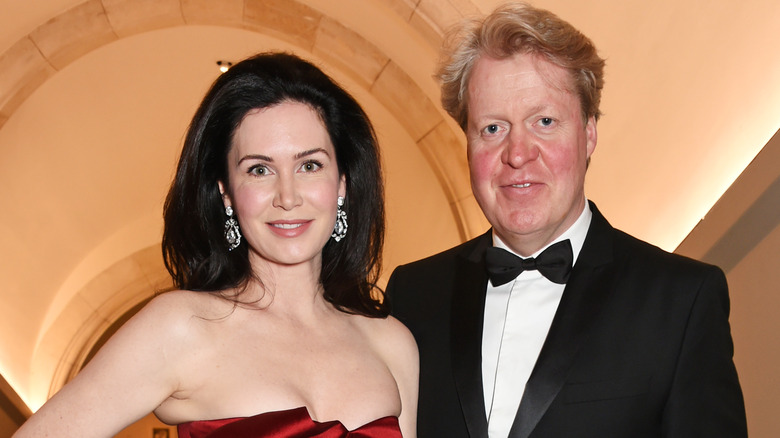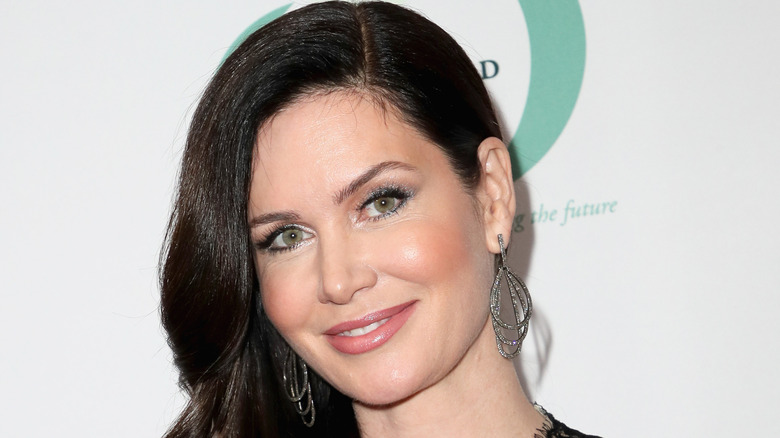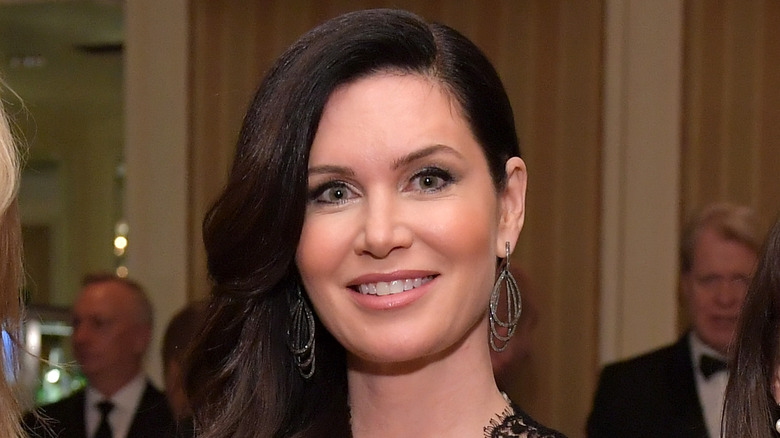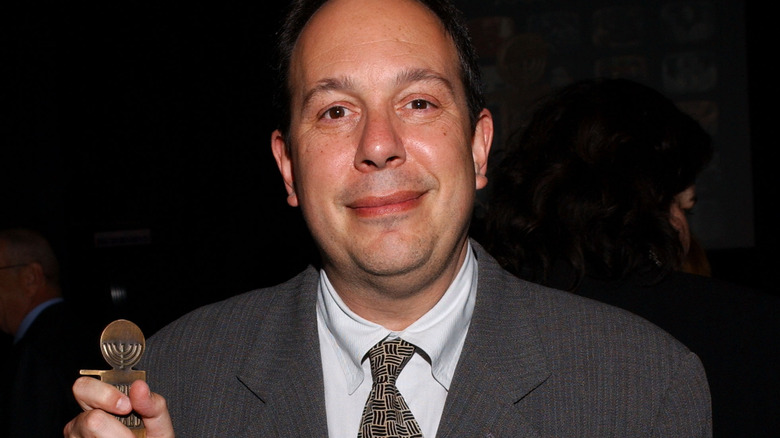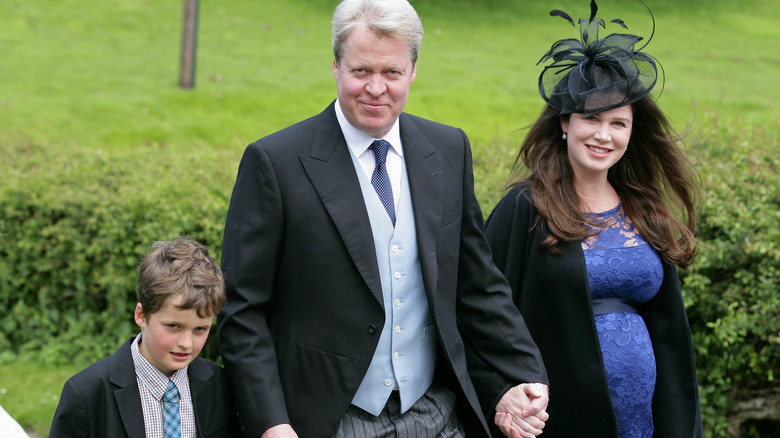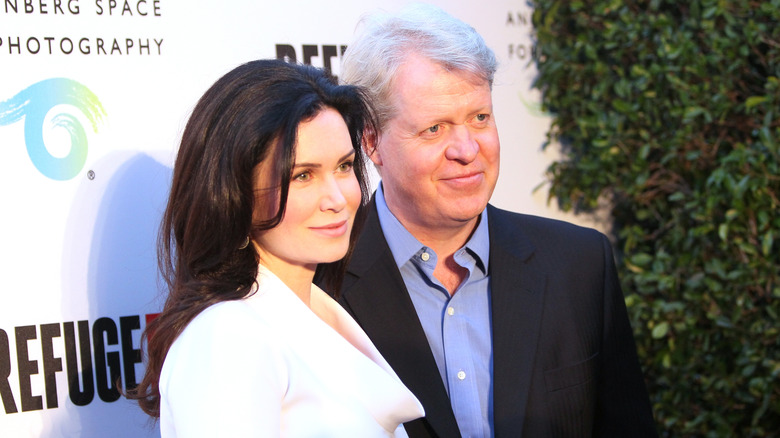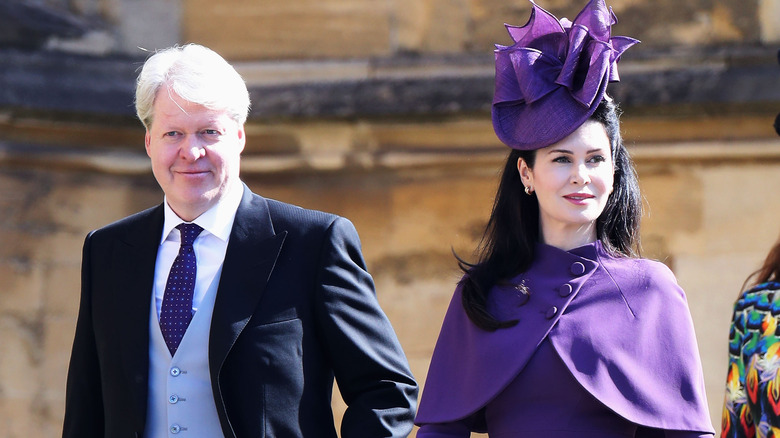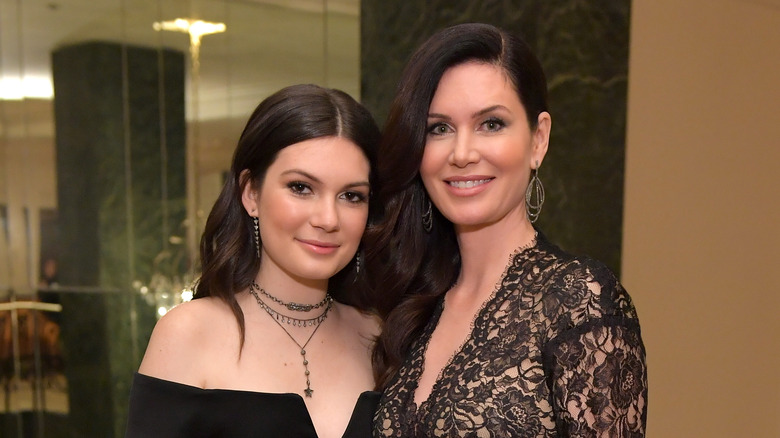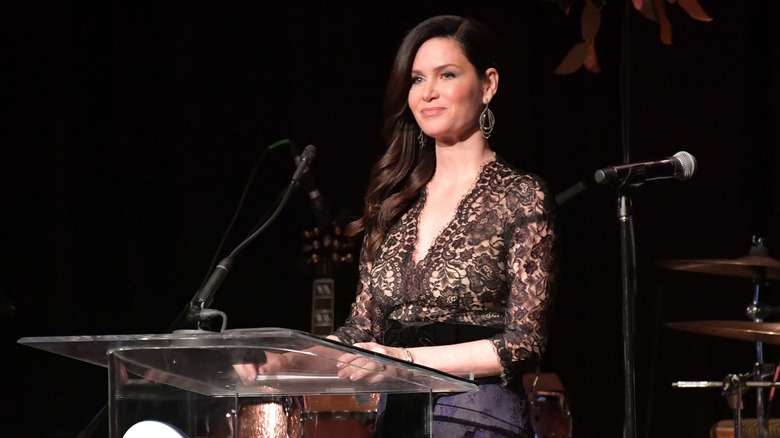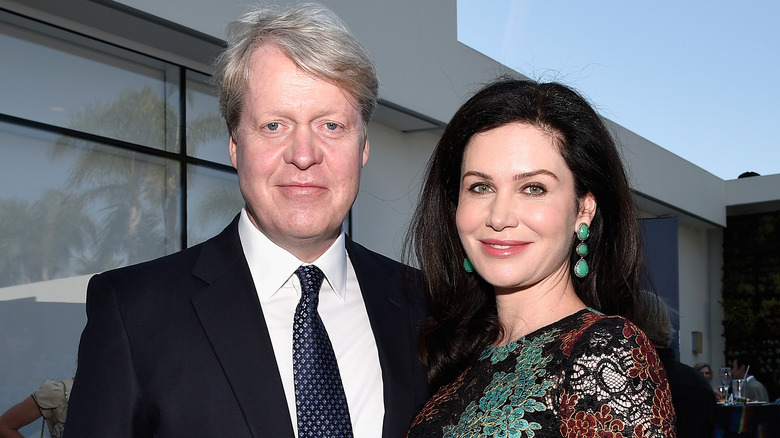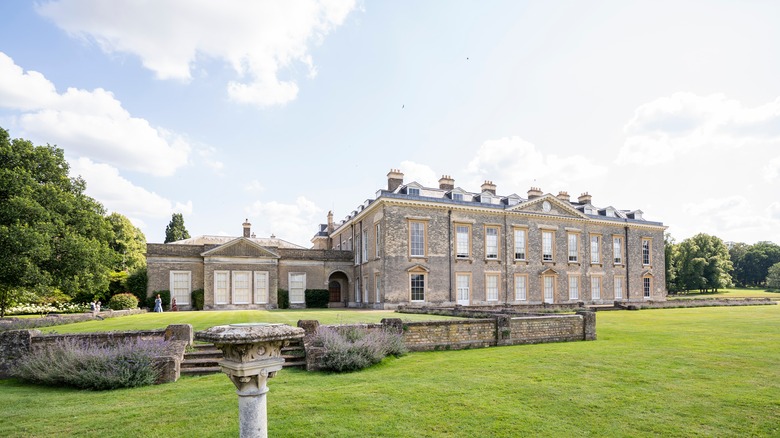Who Is Charles Spencer's Wife, Karen?
Growing up, most people single out one distinguished life path to follow; however, Karen, the Countess of Spencer, didn't limit herself to only one claim to fame. She is acknowledged around the globe for her humanitarian efforts to support one of the world's most vulnerable populations through the spread of education, training, and funding. She is a prime example of a person who uses their wealth and influence to better the lives of those who are suffering. Karen also embodies the sentiment of "you can do it all," as this Canadian-born former model and social entrepreneur strides confidently alongside the most elite of British society with ease and grace. Along with her keen sense of style and flawless presentation, she carries confidence befitting a person who has accomplished great things in her lifetime.
The businesswoman-turned-noble proves that you don't have to choose a single road to success and that the privilege we experience can always be used to serve those around us. Her accomplishments serve as reminders that passion, grit, and dedication to one's mission can leave lasting impressions on the world around us. If you're not already familiar with Karen, here are some of the most important things to know.
Who is the Countess of Spencer?
Karen Spencer (née Villeneuve) is the founder and CEO of Whole Child International, a nonprofit, non-government organization that works to aid children in orphanages worldwide by providing training and financial assistance for their caregivers. Since 2004, she has been recognized as an activist for positive social change and a champion for the vulnerable and underserved.
Spencer's organization teaches the childrearing techniques of Hungarian pediatrician Dr. Emmi Pikler, who centered her approach to childcare on developing loving, respectful relationships with children from the earliest stages of life rather than denying them the opportunity to form attachments with those who care for them. Whole Child International also seeks to improve the quality of care for children in orphanages by supplementing caregiver pay so that individuals can earn a livable wage while doing one of the most critical tasks on the planet — caring for the next generation.
After years of building her nonprofit organization and traveling internationally to orphanages in developing countries, firmly establishing herself as a prolific philanthropist and businesswoman, Karen once again opened up to the prospect of married life. In 2011, she became the Countess of Spencer when she married Princess Diana's younger brother, Charles, 9th Earl of Spencer, in an intimate gathering at the Spencers' ancestral seat, Althorp House.
She moved around a lot as a kid
Karen Spencer didn't have the luxury of enjoying a longstanding childhood home while she was growing up. Her father was an administrator for Canada's national parks and frequently moved his family around the country to fulfill the demands of his position. As a result, Karen and her siblings had to endure the hardship of packing up and moving multiple times throughout their younger years.
As the countess recalled when speaking to Forbes, she relocated at least 20 over two decades, and the toll of being unable to grow roots in any one place deeply affected her. These frequent moves influenced her ability to establish a sense of stability and attachment in her later relationships. Her struggle with constant upheaval guided her conviction to provide safe, secure, and nurturing environments for children in all living situations, especially those raised in orphanages.
As the oldest of three siblings, Karen felt her role was to be a steadfast and loving figure for her younger brothers. This sense of responsibility is a precursor for her professional efforts later on as she sought to provide the same comfort and support to the children she encountered through Whole Child International.
She briefly attended college and became a model
Karen Spencer's emerging adulthood was a period of new adventures and breaking the mold. After finishing high school, she tried the conventional route of attending college to further her education before entering the workforce. She enrolled at a university in Toronto, where she studied for a time before deciding that academia was not where she wanted to be. It's not hard to believe that the woman described as a "timeless beauty" by her husband decided to try her hand in the modeling and fashion industry after leaving her student days behind her. She was successful and paid well for her work posing for clothing catalogs, but she eventually grew to dislike the job and opted for a different career.
Karen transitioned to hospitality and landed a front desk position at Toronto's acclaimed and luxurious Four Seasons. She put her people skills to the test and interacted with high-profile characters on a regular basis. It was there that she met her first husband in 1994.
Her first husband was a Hollywood producer
Karen Spencer is currently recognized as the 9th Earl of Spencer's wife; however, Charles Spencer is not her first famous husband. In 1997, Karen married Mark Gordon, who would later be credited as the producer of the award-winning films "Saving Private Ryan" and "The Patriot." "Grey's Anatomy" fans might also find Gordon's name familiar, as he is also the executive producer of the popular drama series.
After dating for a few years, the couple married and moved to Los Angeles, where Karen gave birth to their first daughter in 1998. Though the marriage wasn't necessarily lengthy, Gordon would play a valuable role in the founding of Whole Child International, even though Spencer began pursuing that goal during their separation and later divorce.
In 2003, before the divorce was finalized, Gordon advanced Karen $1.3 million of what would be a portion of her divorce settlement so she could lay the foundation for her nonprofit. Their marriage ended amicably, and Gordon went on to publicly praise his ex-wife for her mission, telling Forbes in 2007, "This is a wonderful thing that she is doing."
She discovered her passion after taking parenting classes
When Karen Spencer became a mother, she wanted to ensure that she was doing everything in her power to be a loving caregiver; thus, she enrolled in parenting classes designed to teach the practices of Hungarian pediatrician Dr. Emmi Pickler.
Elsa Chahin, the president of Pikler/Lóczy USA, described the Pikler approach in a 2008 article, writing, "Children are considered active participants in their care from their youngest age, never passive objects or mere recipients of care." This essentially means that children are living humans who engage with adults who should care for and respect their autonomy and allow them to be active participants in their care. The Pikler approach affirms that trusting and reliable relationships between child and caregiver are essential for child development.
After taking classes, Spencer felt a deep connection to the Pikler method. Following her separation from Mark Gordon in 2003, she took the opportunity to visit the Pikler Institute in Budapest, Hungary, which had been established by Dr. Pikler herself in 1946. There, Spencer viewed the facilities and observed the teachings she had found so fascinating. The Pikler Institute stood out from other children's homes due to the distinct difference in care provided. Spencer also took special note of the fact that the children of the Pikler Institute appeared happy. They laughed, smiled, and played like her well-loved daughters at home. If she hadn't been convinced before, she made a complete believer by the time she left Budapest.
She became an entrepreneur because UNICEF rejected her proposal
When Spencer returned to L.A. after her visit to the Pikler Institute, she wanted to bring the concepts and methods she had learned abroad to the United States. Being full of hope and desiring to be helpful, she called UNICEF's headquarters in New York and offered to fund a weeklong training session at the Pikler Institute for a group of volunteers. It was then that she learned UNICEF held firmly to a sentiment popularized in the early 1900s that rejected the institutionalization of children in orphanages in favor of placing them in foster care.
It wasn't only UNICEF that had decided to move away from placing children in orphanages. The World Health Organization and the World Bank also refrained from supporting them. This anti-orphanage sentiment would be an obstacle, but Karen was not deterred. She had been genuinely inspired by what she had seen in Hungary, and the contempt for child-rearing institutions would not stand in her way.
Karen understood that people held a difference of opinion on the matter, but a distaste for orphanages did not mean that they would cease to exist, especially in developing countries. No matter what other organizations thought of them, orphanages still operated, and children still lived within them; therefore, the issues and hardships faced by these institutions deserved attention and action. This rebuff from UNICEF led Karen toward the creation of Whole Child International, thereby becoming a renowned social entrepreneur.
She began dating Charles Spencer soon after he ended his engagement
After her divorce in 2003, Karen Spencer devoted much of her time to Whole Child International. She traveled to dozens of orphanages worldwide, organized training sessions with the Pikler Institute, and was embroiled in the business aspect of being a CEO. It is safe to assume that she didn't have much time for romance.
However, in 2010, Karen met Charles Spencer met during a blind date set up by one of the earl's colleagues just weeks after he ended his brief engagement with Lady Bianca Eliot. This was far from the earl's first breakup. He had been married twice before, first to Victoria Lockwood from 1989 to 1997, then to Caroline Freud from 2001 to 2007. His engagement to Lady Bianca began in March 2010 and ended in September of the same year.
In an interview with The Royal Observer, Countess Spencer admits, "It wasn't instant," referring to her attraction to the earl at the time of their meeting. She went on to say, "It took a minute. I mean, obviously, he's very handsome, interesting, and charming, but I was a jaded 38-year-old by the time I met him." Even after stating that she had not instantly fallen in love with Charles, the couple's relationship and subsequent engagement were far from drawn out, as they were married on June 18, 2011 — less than a year after their first meeting.
She quite likes being Charles' third wife
Most people might harbor a bit of concern at the thought of becoming someone's third spouse, and that apprehension is not unfounded. In an article for Psychology Today, psychiatrist Mark Banschick explained that it is more likely than not that a second or third marriage will end in divorce: "67% of second, and 73% of third marriages end in divorce." These statistics are enough to make anyone second guess tying the knot with someone who has been divorced multiple times, but Countess Spencer boldly declared in an interview that she is not bothered by the fact that her husband had been married a couple of times before. As she told The Sunday Times, "I've been a first wife and a third, and — trust me on this — you really want to be the third because men are so motivated at this point. They are really, really, paying attention."
This belief in Charles' ability to continuously improve himself initially endeared him to her. In the same interview, Spencer elaborated on her husband's previous marriages, saying that the end of his past relationships pushes him to do better and grow. Being a person whose own drive for personal and professional improvement had made her astoundingly accomplished so she no doubt appreciates his determination to learn from past mistakes.
She has three daughter and six stepchildren
Karen Spencer has two daughters, Emma and Kate, from her previous marriage to Mark Gordon. The Earl and Countess of Spencer share one daughter, Charlotte, born in 2012. As for Charles, he has six other children from his previous two marriages. With his first wife, Victoria Lockwood, he welcomed Kitty, Eliza, Amelia, and Louis.
According to The Associated Press, the then-Viscount of Spencer had relocated the family to Cape Town after the media alleged he'd had multiple affairs. After he and Lockwood divorced, Spencer returned to England, but his ex-wife and their children remained in South Africa. The Countess of Spencer explained her relationship with the Earl's first set of children to The Sunday Times, stating, "Charles' older four were pretty much grown up when I came onto the scene, so my job ... was simply to make everyone feel welcome." From his second marriage to Caroline Freud, Charles welcomed two additional children, son Edmund and daughter Lara.
The countess confessed that being a stepparent is not her strongest skill. She praised her husband for being better suited to the task. "Charles gave me the best advice, which is to say nothing and do nothing about anything, ever," Spencer told The Times. This may sound harsh, but Karen explained that when she has opinions about their behavior, she privately brings her concerns to her husband rather than directly addressing his children.
She's been recognized with a number of accolades
As a result of her years of humanitarian work, Spencer has received multiple awards, honors, and recognitions from famous individuals, groups, and institutions.
Spencer's nonprofit organization, Whole Child International, was honored to receive a visit and the personal support of the Dalai Lama in 2010 for its contributions in improving the lives of vulnerable children in the developing world. Spencer was later made a fellow by the Ashoka Fellowship, an international fellowship for social entrepreneurs who enact powerful, positive social reform. Karen was also granted a fellowship at the University of Northampton the following year.
In 2017, People named Karen one of the "25 Women Changing the World," which describes the tangible successes of the countess' efforts to enact change in childcare systems by promoting a culture of care and human connection in orphanages. "Simply by ensuring that children have a quality primary-care relationship, they will grow stronger," Karen told the publication.
She helped Charles change his mindset after his difficult childhood
Both Karen and Charles Spencer experienced less-than-ideal childhoods, with the earl's mother relinquishing custody of her children and the countess' frequent moves. The hardship of being without his mother from an early age hurt Charles and impacted his adult relationships in a negative way. The countess was empathetic toward his struggles, as she had witnessed similar wounds in the children she met through her work with Whole Child International. They, too, suffered the loss of one or both of their parents. She described her husband's plight in an interview with The Sunday Times: "When you're damaged, you look for damage. If you've experienced trauma and abandonment to the degree Charles did, your brain is hard-wired. I think we are particularly suited to each other."
The countess' empathy did not go unnoticed by her husband. He expressed in an interview with Vogue that Karen had shifted his troubled mindset in a positive direction after their marriage. With her help, he acknowledged that his past efforts to overcome his trauma were fruitful. The countess expressed her pride in her husband's efforts toward self-improvement, telling The Times, "The most appealing thing about Charles for me was how willing he was to work on himself and continue to do so." Moreover, Charles shared with Vogue that the pair enjoy "a supportive partnership" and rely upon each other's strength in times of personal hardship.
She created a web series to share the history of the Spencers' ancestral home
In 2022, Karen Spencer launched a web series on Youtube titled "Spencer 1508." In it, she shares the history of Althorp House, the ancestral home of the Spencers, and their family history. As she introduces the series to viewers, Karen described her awe and fascination for Althorp as well as her underestimation of how vastly encompassing her role as lady of the house would be regarding the time and attention that goes into restoring and utilizing all of the wonders within.
She equates living at Althorp to exploring a museum after hours, as the house is filled with stunning antiques dating back hundreds of years. She relies on her husband, the Earl of Spencer, to share his family's story and relay the significance of the land, house, and furnishings to their audience.
"It's just such an unbelievable privilege to get to be a part of this 500-year-old story," Karen said in the series. Being fully aware of her great responsibility to care for the house, she and Charles hope not only to restore the estate to its former glory but also to make improvements and spread knowledge of the Spencer family's rich history.
